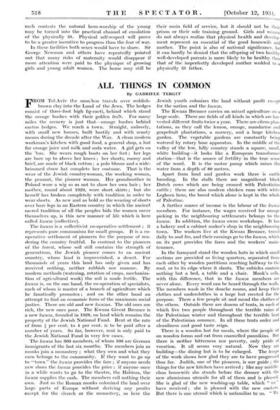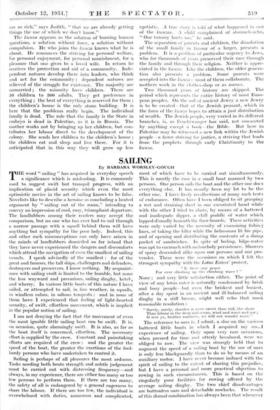ALL THINGS IN COMMON
By GABRIELE TERGIT
FROM Tel-Aviv the ornn:bus travels over reddish- brown clay into the Land of the Jews. The hedges consist of three-foot high fig-cacti, behind which stand the orange bushes with their golden fruit. For many miles the scenery is just that—orange bushes behind cactus hedges. We reach a town. Straight, unlovely, with small new houses, built hastily and with scanty means during the decade after the War. A clean modern workman's kitchen with good food, a general shop, a hut for orange juice and milk and soda water. A girl gets on the 'bus. She wears rough boots on her feet ; her legs are bare up to above her knees ; her shorts, roomy and brief, are made of black cotton ; a polo blouse and a wide- brimmed straw hat complete her costume. That is the wear of the Jewish countrywoman, the working woman, the peasant, the pioneer woman. Her grandmother in Poland wore a wig so as not to show her own hair ; her mother, round about 1920, wore short skirts ; but she herself has broken completely with tradition in order to wear shorts. As new and as bold as the wearing of shorts over bare legs in an Eastern country in which the ancient sacred tradition of all the peoples bids the women cover themselves up, is this new manner of life which is here called kwuza (collective).
The kwuza is a collectivist co-operative settlement ; it represents pure communism for small groups. It is a co- operative settlement of pioneers for the purpose of ren- dering the country fruitful. In contrast to the pioneers of the forest, whose soil still contains the strength of generations, the Jewish pioneer comes to an ancient country, whose land is impoverished, a desert. For thousands of years this land has only given and has received nothing, neither rubbish nor manure. By modern methods (watering, rotation of crops, mechaniza- tion of agricultural work) the soil is made fertile. The kwuza is, on the one hand, the co-operation of specialists, each of whom is master of a branch of agriculture which he fanatically promotes ; and on the other hand an attempt to find an economic form of the maximum social justice. There are old and new kwuzas. The old ones are rich, the new ones poor. The Kwuza Giveat Brenner is a new kwuza, founded in 1928, on land which remains the property of the Jewish National Fund. Rent at the rate of from per cent. to 4 per cent, is to be paid after a number of years. So far, however, rent is only paid to the Jewish National Fund in very few cases.
The kwuza has 300 members, of whom 100 are German immigrants of the last six months. The members join as monks join a monastery ; what they own and what they earn belongs to the community. If they want to go up to " town " the kwuza provides the fare ; if anyone needs new shoes the kwuza provides the price ; if anyone once in a while wants to go to the theatre, the Habima, the kwuza supplies the cash. The members call nothing their own. Just as the Roman monks colonized the land over large parts of Europe without deriving any profits except for the church. or the monastery, so here the Jewish youth colonizes the land without profit except for the nation and the kwuza.
The Kwuza Brenner carries on mixed agriculture on a large scale. There are fields of all kinds in which are har- vested different fruits twice a year. There are citrus plan- tations, as they call the lemon, orange, mandarine and grapefruit plantations, a nursery, and a large kitchen garden. The vegetable gardens are constantly being watered by rotary hose apparatus. In the middle of the valley of the low, hilly country stands a square, small, white building—it looks like a European transformer station—that is the source of fertility in the true sense of the word. It is the motor pump which raises the water from a depth of 80 metres.
Apart from land and garden work there is cattle breeding. In the stalls there are magnificent black Dutch cows which are being crossed with Palestinian cattle ; there are also modern chicken runs with white Leghorn hens, the breed which alone is kept in the whole of Palestine.
A further source of income is the labour of the kwuza members. For instance, the wages received for orange picking in the neighbouring settlements belongs to the kwuza. In addition, the kzeuza owns workshops. It has a bakery and a cabinet maker's shop in the neighbouring town. The workers live at the Kwuza Brenner, travel daily to and fro, and their earnings go to the kwuza, which on its part provides the fares and the workers' main- tenance.
In the farmyard stand the wooden huts in which small sections are provided as living quarters, separated from each other by wooden partitions reaching halfway to the roof, or to its edge where it slants. The cubicles contain nothing but a bed, a table and a chair. Monk's cells, with this difference, that in the kwuza members are never alone. Every word can be heard through the walls. The members wash in the douche rooms, and keep their clothes and underclothes in a large hut erected for the purpose. There a few people sit and mend the clothes of the others. Outside there are dozens of tents, in each of which live two people throughout the terrible rains of the Palestinian winter and throughout the terrible heat of the Palestinian summer. In all these tents order and cleanliness and good taste reign.
There is a wooden hut for meals, where the people sit on wooden forms and eat from enamelled pannikins. But there is neither bitterness nor poverty, only pride of vocation. It all seems very natural. Now they are building—the dining hut is to be enlarged. The tempo of the work shows how glad they are to have progressed thus far. Judith, one of the pioneers, is our guide ; the things for the new kitchen have arrived ; like any middle- class housewife she stands before the dresser with the new aluminium utensils for all of them and is pleased. She is glad of the new washing-up table, which " we " have received ; she is pleased with the new cookers. But there is one utensil which is unfamiliar to us. " are so rich," says Judith, "that we are already getting things the use of which we don't know."
The kwuza appcafs as the solution of burning human questions, a solution without force, a solution without compulsion. He who joins the kwuza knows what he is about. He renounces the striving for personal welfare, for personal enjoyment, for personal nourishment, for a pleasure that one gives to a loved wife. In return he receives the protection and aid of a community. Inde- pendent natures develop there into leaders, who think and act for the community ; dependent natures are relieved of the struggle for existence. The majority are unmarried ; the minority have children. There are 50 children to 300 adults. They get preference in everything ; the best of everything is reserved for them ; the children's house is the only stone building. It is here that the problems really begin. The individual family is dead. The rule that the family is the State in embryo is dead in Palestine, as it is in Russia. The Mother works not by bringing up her children, but con- tributes her labour direct to the development of the colony. She sends her children to the children's house ; the children eat and sleep and live there. For it is anticipated that in this way they will grow up less egotistic. A true story is told of what happened in one of the kwuzas. A child complained of stomach-ache. "Our tummy hurts me," he said.
The separation of parents and children, the dissolution of the small family in favour of a larger, presents a problem. It is a problem of particular urgency to Jews, who for thousands of years preserved their race through the family and through their religion. Neither is appre- ciated in the kwuza. Like the children, the older genera- tion also presents a problem. Some parents were accepted into the kwuza ; most of them collaborate. The mothers work in the clothes-shop or as nurses.
Two thousand years of history are skipped. The period which represents the entire history of most Euro- pean peoples. On the soil of ancient Jewry a new Jewry is to be created—that of the Jewish peasant, which in the form of the kwuza hopes to attain a just distribution of wealth. The Jewish people, very varied in its different branches, is, as Feuchtwanger has said, not connected by anything except a book—the Bible. But here in Palestine may be witnessed a new link within the Jewish people—a fierce striving for justice, a striving that leads from the prophets through early Christianity to the kwuza.















































 Previous page
Previous page